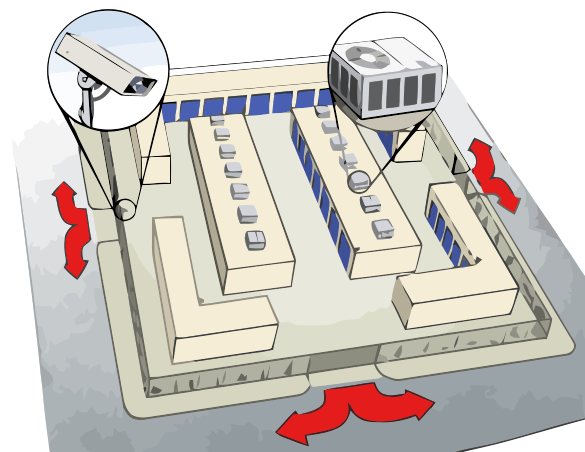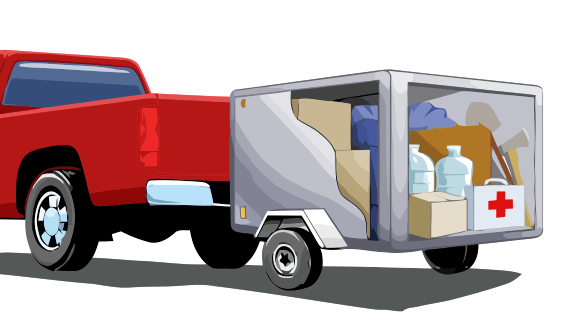The Doomsday Prepper’s Guide to Self Storage
Table of Contents

The unstable nature of world events has led to growing fears that life as we know it may come to an unexpected end. Economic collapse, global war, terrorism, pandemics and natural disasters have all been cited as reasons to prepare for the worst. Some people, known as Doomsday Preppers, devote a great deal of time and money to preparing for such apocalyptic conditions. This movement has become popular enough that there's even a TV show dedicated to their activities.
Should You Be a Prepper?
When food, water, fuel, electricity, police protection or social safety nets no longer exist, preppers aim to be self-sufficient and able not only to survive, but to thrive despite the chaos around them. As with any segment of the population, some preppers fall into the irrational fringe category, but many of these individuals are otherwise “normal” people who happen to be driven to develop survival skills be they in the form of historical study, military and technical experience, frugal practices or higher education.
And so survival preparedness has become a way of life for many. Some preppers have even formed community support networks. They've devised detailed plans for homesteading and bartering with like-minded families in the event of a large-scale meltdown. The process of preparing for such an existence involves not only careful planning but gathering and storing a significant amount of supplies.
What Materials Do You Need to Store?
To join the ranks of the well-prepared, you must accumulate many essential items. Food, water, medical supplies, fuel and personal protection will meet immediate needs, but the fallout from a catastrophic event isn't likely to be a short-term situation. The abilities to sustain food production, filter water, secure personal property and generate power are critical to long-term survival. Supplies needed for extended stability can include stores of wood, back-up generators, farming equipment, seeds, canning and cooking needs, non-electric appliances, charcoal, tools, gas masks, reference materials and communication devices.
Self-Storage For Prepping?
Although there are many ways to store supplies, self-storage units have specific benefits that may closely match the needs of certain emergency situations. Curiously the use of storage units is not typically covered or discussed. So here are a few uses for self storage that you may not have thought of.
Enhance Your Getaway Plans

Portable self-storage units can be kept at various locations to store items that must be accessed immediately in an emergency. If a situation arises that necessitates a quick getaway, a portable unit can be pre-packed and ready to go anywhere. If this is not a practical or discreet option for your property, an alternative is to rent a large garage-type storage unit at a traditional facility and store a working vehicle or “bug-out” trailer that is fully packed with supplies. In many places a unit is going to cost less than a parking spot while also being more secure from people and the elements.
Storage facilities are also often located in easy to access areas. By reviewing the location on a map you can confirm that there are 3 separate access routes – a rule of thumb that can ensure safe passage to your supplies.
Climate Control
Many self-storage facilities offer climate-controlled units. These are useful when storing medications and other temperature-sensitive items. In addition to temperature control, humidity is also monitored; this can help prevent mold growth on vulnerable materials.
Security
Using a remote facility ensures that your supplies do not become an easy target. Conspicuous storage units on your property may attract the wrong attention. For sensitive and highly valuable contents, seek a facility that provides a high degree of security. Video monitoring, good lighting and exclusive access to your unit can provide some reassurance that theft risks are lower.
Also consider security in the event of a disaster. At that time, many people will be on the lookout for easy targets to bolster their own supplies. Luckily, storage units are typically thought to contain furniture or other household objects that are of little value in a crisis. So storing food or other supplies in a unit may be just counterintuitive enough to buy you enough time to get to your unit and load up your bug out vehicle.
Just to be on the safe side, keep the contents of your unit a secret. Don't tell the facility manager or other storage unit renters what you're storing. Also, rent a drive-up unit and block the entrance with your vehicle as you unload – a totally natural thing to do that will also block the view from nosey passersby. Consider putting your supplies in nondescript boxes so that you can carry them in and re-arrange them without giving revealing their contents. You could even come up with a code for labeling the boxes such as calling a box full of food “kitchen utensils”.
Altruism Without Risk
If you're a prepper, you've probably encountered some skepticism or even ridicule from others. And yet if a disaster did occur, those same people would likely be turning to you for help. Keeping a store of life-saving essentials can help you to help others in a time of great need, and maintaining a separate self-storage unit for community assistance gives you the ability to share access to supplies without allowing strangers into your private reserve or home.
Natural Disaster Preparedness
Hurricanes, floods, tornadoes and many other natural threats can potentially destroy your private home. If you keep a store of food and survival gear in two separate locations, you have a better chance of being able to access at least one disaster strikes. Many self-storage facilities are constructed to survive severe weather, and others may be spared due to their geographical location or elevation so do your homework.
As you can see, a little creativity and a little planning can go a long way in enhancing your preparedness without a lot of additional cost. And by their very nature, you can discontinue your rental at any time if you come up with a better plan or move to another location. Few other options provide such flexibility.


 (2 votes, average: 4.50 out of 5)
(2 votes, average: 4.50 out of 5)
Leave a Reply